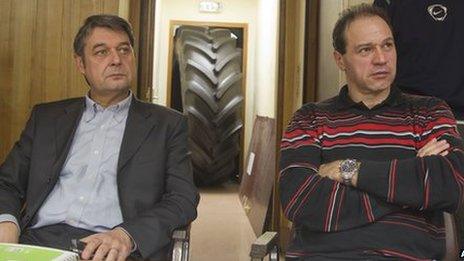Air France: What is it with le mob?
- Published
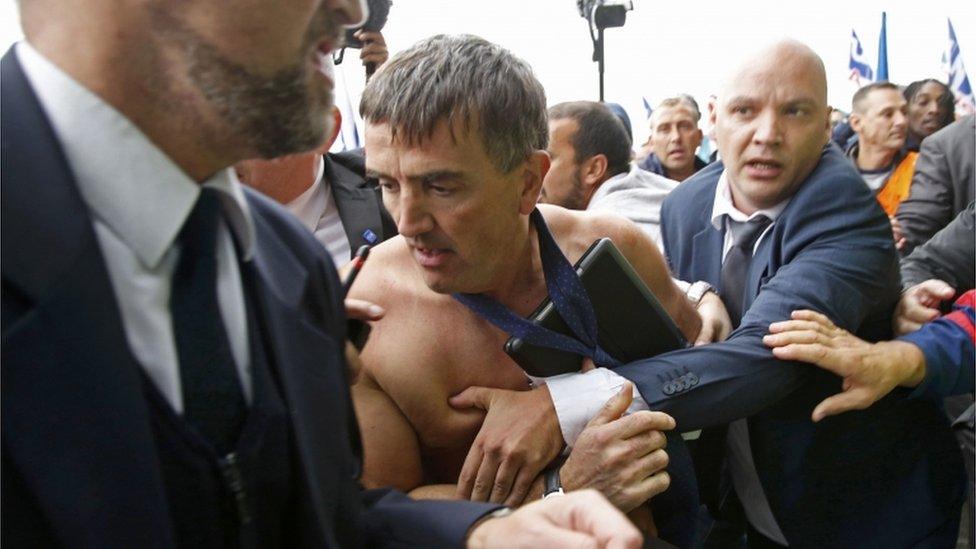
Xavier Broseta had to be escorted away from the protesters
The shocking images of two Air France executives with their shirts ripped off running from a crowd of angry workers poses yet again the question of industrial relations in France: how did they get to be so bad?
Even allowing for the ubiquity of cameras and their tendency to dramatise events that maybe went unseen in the past, these scenes were disturbing.
Among the Paris commentariat, there is general agreement. "The uncontrolled excesses sum up better than any speech the social blockage which afflicts the country," said Le Figaro.
Financial daily Les Echos said: "A few hundred hotheads have broken a symbolic barrier: the one separating a modern society where conflicts are settled through dialogue, and a culture where what counts is brute force."
But the truth is that mob violence is far from a new phenomenon in France.
The question is whether today's conditions are making it worse.
Recent years have seen regular reports of workers "kidnapping" bosses in order to exert pressure during negotiations.
In 2014, for example, it was two managers at Goodyear in Amiens who were "bossnapped", external for more than a day, after the plant was threatened with closure.
Sometimes the workers have trashed management offices; sometimes - especially when a factory is being shut - they have gone further and smashed machinery.
One practice - documented at a factory in Auxerre - was to force the manager to take part in a demonstration against his own policies: a kind of humiliating symbolic confession.
Revolutionary legacy
If some of this is redolent of the French Revolution - with its jeering abuse of the class enemy - then that is no coincidence.
French political and social culture is still strongly under the influence of 1789-93, though of course with an admixture since of conservative counter-currents.
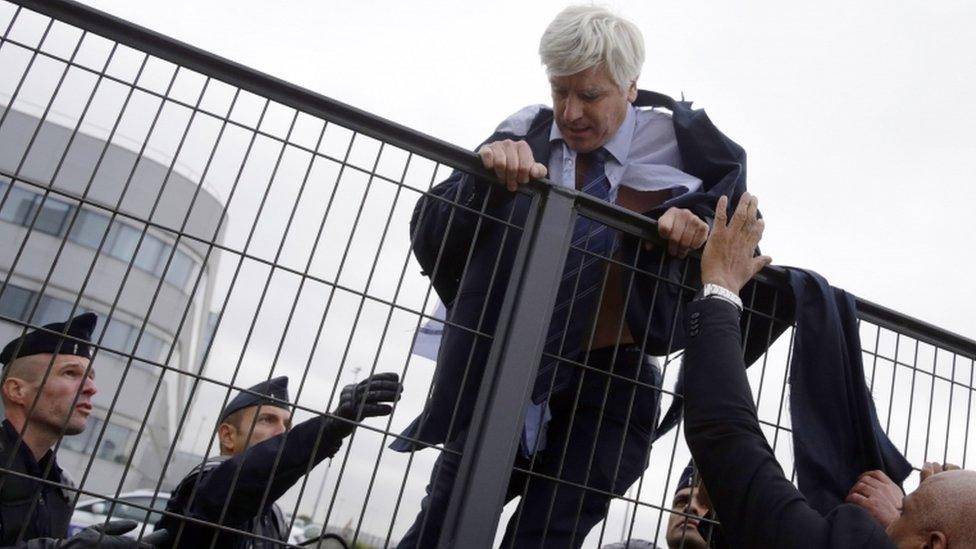
Pierre Plissonnier also endured a tough time
Memories of the Revolution have been relived at regular intervals: the uprisings of 1830, 1848, the Paris Commune of 1871; the bitter divisions over church and state at the start of the 20th Century; the undeclared civil war in World War Two; the street clashes of May 1968.

1968 student protests:
May 1968 became synonymous with chaos and revolutionary zeal, as students in Paris, initially angered by university reform, challenged the status quo, erecting barricades round the Sorbonne university.
The violence police used to suppress the protesters brought French workers on to the streets in their support. As the protests grew, the country was almost brought to a standstill.
In a "back me or sack me" speech on 30 May, President Charles de Gaulle called a snap parliamentary election. The June poll resulted in a resounding victory for the Gaullist conservatives, which ended the crisis and restored the president's authority.
In the longer run, however, the 1968 revolt helped undermine the legitimacy of General de Gaulle, who stood down the following year.

In a way that would surprise people in the UK - where a free-market culture has taken root over the past 25 years and business leaders are heroes - in France the language of class war is still very much alive.
In some companies, union notice-boards carry posters that can be quite alarming to the unprepared: cartoon caricatures of bosses - fur coats, cigars, dollar bills tumbling from waistcoat pockets - not much different from what would have been on display in the 1930s.
Strikes and protests are universally described in the media as being conducted by such-and-such a group of workers "en colere [angry]" - the description implicitly conceding the justice of their cause.
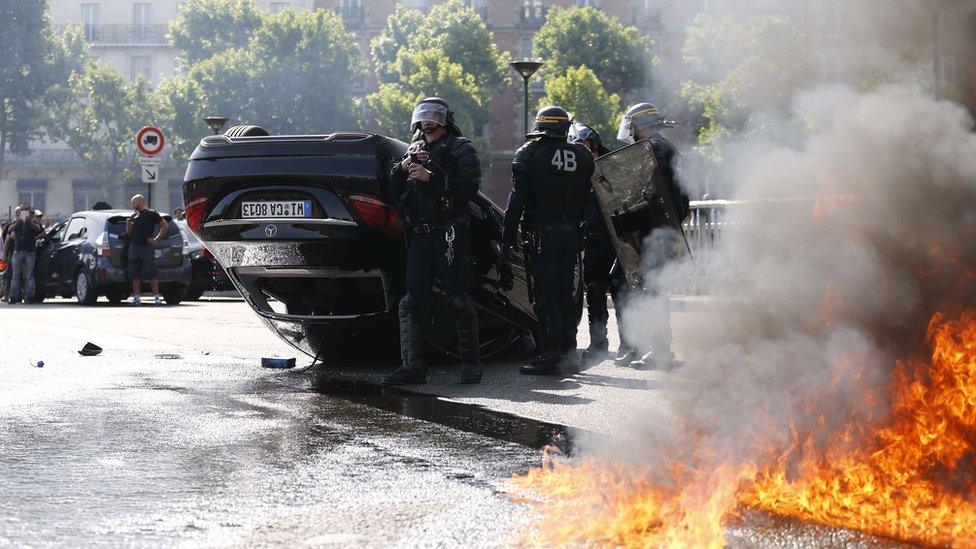
Riot police responded to protests in Paris after French taxi drivers overturned cars and set fire to tyres in protest against taxi app Uber
Society's failure to ever completely disavow arguments against wealth accumulation results in public behaviour that may be frowned upon, but never quite prohibited.
Farmers in Brittany set fire to tax offices; taxi drivers beat up Uber drivers, external and block the Paris ring road; travellers burn tyres on the motorway, external to Lille; migrants storm fencing at Calais.
Time and again, police are under orders not to stop the disruption, but just to limit it.
Again, this is a legacy of Revolution.
The danger of genuine violence can never be discounted in France, so the authorities understandably err on the side of appeasement.
But the effect is to legitimise actions that in other countries would incur the full force of the law.
In the same way, the state is expected to step in to resolve disputes, and often does so with offers of public money - even though this merely whets the appetite of future demonstrators.
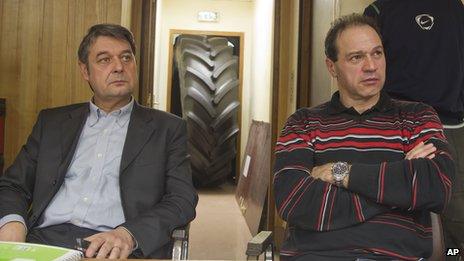
Bernard Glesser (left) and Michel Dheilly were held captive at the Goodyear plant in Amiens
But if workers' protests have long been part of the French way of life (the first bossnapping was more than 100 years ago), can it be argued that they are getting worse?
The answer is yes.
One reason is the general social climate in France.
Today, the French talk of "economic crisis" as a fact of life. There is mass unemployment, and people live on very low incomes.
Politics changes nothing, so the mood favours dissent.
Secondly, there is the effect of social media, which exaggerates grievances and whips individuals into states of righteous hatred.
Air France human resources manager Xavier Broseta was forced to climb over a fence to escape
And thirdly - and linked to these - is the sidelining of the official union representation.
Unions - paradoxically - are weak in France, in the sense that membership levels are low.
They are strong only in the sense that the law accords them a central place in the running of workers' lives.
They are thus part of the "system" - and the system is one that many working people feel has failed them.
So these people take direct action, outside of official union channels.
And unions - desperate to catch up with la base (the grassroots) - find themselves justifying behaviour they would otherwise have condemned.
This is what happened at Air France.
After the attack, one member of the CGT union said the violence suited management because it distracted attention from the real issues.
Worker-manager tensions are nothing new, and one should never forget that countries all over the world - not least the US - have seen outbreaks in the past of workplace violence and repression.
If the outside world is shocked by the Air France incident, some would say it is because the rest of the world has found new ways of dealing with labour conflict.
Others might say the rest of the world is docile: at least in France workers still fight the fight.
- Published5 October 2015
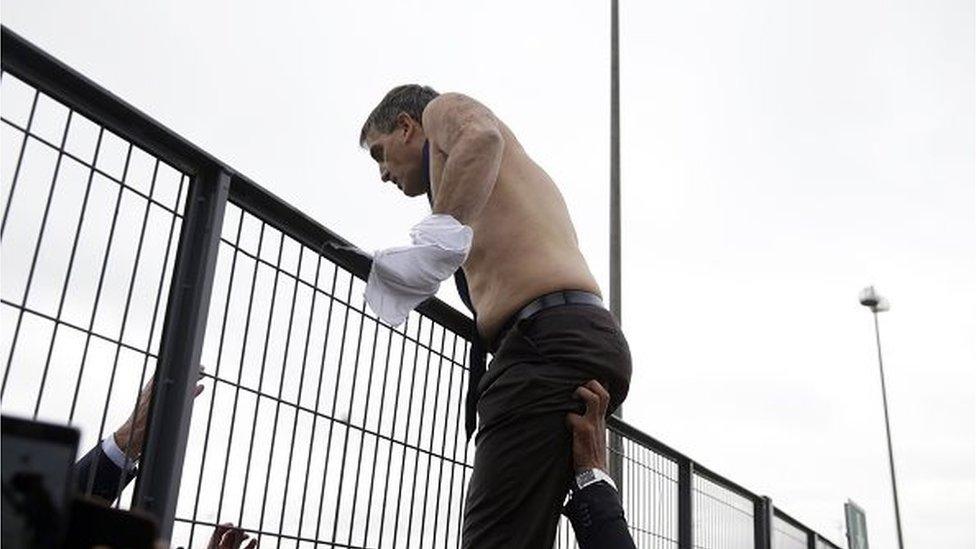
- Published26 June 2015

- Published6 January 2014
